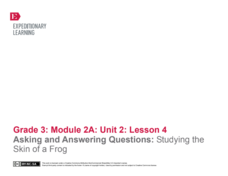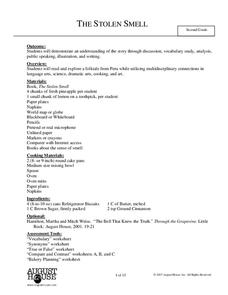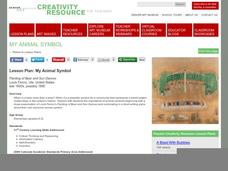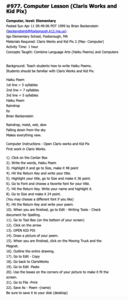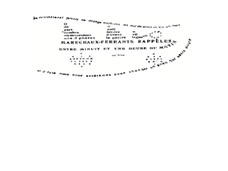EngageNY
Grade 9 ELA Module 2: Unit 1, Lesson 10
An engaging unit connects Edgar Allan Poe and Emily Dickinson's shared themes of madness and departure from reality. The 10th lesson in the unit explores Dickinson's figurative language and structure choices in "I Felt a Funeral, in my...
EngageNY
Grade 9 ELA Module 2: Unit 1, Lesson 9
Continue analyzing literature using textual evidence with a lesson on "I Felt A Funeral, in my Brain" by Emily Dickinson. Ninth graders bring their annotation skills and knowledge of figurative language from the previous eight sessions...
EngageNY
Grade 10 ELA Module 2: Unit 3, Lesson 4
It is, and it is not. Scholars examine how these words impact Eleanor Roosevelt's speech, in which she tries to persuade the adoption of the Universal Declaration of Human Rights. Readers note rhetoric and figurative language. They then...
EngageNY
Grade 10 ELA Module 4: Unit 2, Lesson 5
When Macbeth says, "Nature seems dead," he uses personification. Using the resource, scholars complete a Quick Write to analyze the impact of figurative language on the mood of Shakespeare's Macbeth. Pupils also participate in an...
EngageNY
Grade 10 ELA Module 4: Unit 2, Lesson 13
Lady Macduff uses a metaphor to suggest that her husband does not possess the courage of even a tiny, short-winged bird—ouch! Using the resource, pupils discover Act 4.2 of Shakespeare's Macbeth. Using reading, writing, and discussion,...
EngageNY
Grade 11 ELA Module 2: Unit 2, Lesson 10
Audre Lorde's poem "From the House of Yemanjá" describes the speaker carrying two women on her back—she must be strong! Pupils read the second stanza using instructional activity 10 of 14 from the Grade 11 ELA Module 2: Unit 2 series....
EngageNY
Grade 11 ELA Module 2: Unit 2, Lesson 5
Elizabeth Cady Stanton compares sins to monsters, using a metaphor to make a point about morality. Using the fifth of 14 lessons from the Grade 11 ELA Module 2: Unit 2 series, learners analyze paragraphs 8-10 of "An Address by Elizabeth...
EngageNY
Grade 11 ELA Module 2: Unit 1, Lesson 16
Take a second look. Scholars examine the chapter "Of Our Spiritual Strivings" as a whole and once again work in groups to discuss Du Bois's use of figurative language. They also complete the Mid-Unit Assessment Evidence Collection Tool...
EngageNY
Asking and Answering Questions: Studying the Skin of a Frog
English language arts and science combine in a lesson that focuses on asking and answering questions about frog skin. Discussion, a read-aloud, and partner work lead the way towards a three-page worksheet that tests learners'...
Curated OER
Reading Poetry in the Middle Grades
Bring the beauty of "Nothing Gold Can Stay" by Robert Frost to middle school language arts. After learners read a copy of the poem, they follow an instructional sequence that focuses on sound, figurative language, and theme.
Institute for the Professional Development of Adult Educators
Using Context Clues with Signal Words
When you come across an unfamiliar word in a text, do you skip it and move on? Practice using context clues to identify words you don't know with a thorough set of language arts lessons. The resource reinforces close reading and critical...
Curated OER
The Stolen Smell
Second graders read the story The Stolen Smell and participate in many language arts based activity connected to the story. They participate in discussions, vocabulary work, analyzing the story, public speaking, illustrating pictures,...
August House
Why Koala Has a Stumpy Tail
Learn about the animals of Australia with a language arts lesson about an Australian folktale called, Why Koala Has a Stumpy Tail. After reading the story as a class, kids discuss events and characters from the book, retell the story to...
Denver Art Museum
My Animal Symbol
Here is an art lesson plan that combines visual arts and language arts into one very nice package. In it, youngsters study a fascinating painting called Painting of Bear and Sun Dances. They begin to understand the importance of...
Catholic Charities
Telephone Skills
The challenge in telephone conversations is that speakers and listeners cannot rely on body language to communicate. This 31-page packet includes a curriculum guide, lesson plans, assessments, and resource lists designed to help language...
Curated OER
Computer Lesson
The writing of Haiku poems is the focus of this language arts lesson. In it, the basic elements of Haiku poetry are presented, and then a step-by-step set of instructions on how to create a Haiku poem along with an illustration is...
Curated OER
Food Pyramid
Here is an engaging cross-curicular lesson which incorporates elements of language arts and heatlh. Groups of learners are assigned to one vowel sound. They work together to find pictures of food out of a booklet that have the long vowel...
Michigan State University
Researching and Compiling Survey Information
Bring Internet research and social issues to your language arts class in this activity. After investigating the topic "Media Violence and How It Affects Teenagers" on the Internet, middle schoolers work in groups to compile their...
Curated OER
Picture Perfect Poetry
Do your language arts students love to draw? Use this lesson plan to reinforce poetic techniques with illustration. After drawing what they think poem would look like with no words, middle and high schoolers work on several different...
Curated OER
Is That Movie OK?
Discuss movies and movie enjoyment with your middle school language arts class. They interpret movie review information, determine appropriate movies, and then write film reviews to share with the class. Focus on using context clues to...
Curated OER
Children of War
Take a closer look at the impact of war in this language arts and social studies lesson. Middle schoolers use primary sources to conduct research as they relate to the effects of war on children. They compare and contrast the effects of...
August House
Stone Soup
Sharing and cooperation are difficult skills for kindergartners to grasp. Using the story Stone Soup and a series of activities, kids learn about the benefits of working together, categorizing and comparing items, and eating healthy foods.
EngageNY
Close Reading of The Boy Who Loved Words: How Do People Build Their Word Power?
Third graders practice the skills of identifying the main message in a story, describing the main character, and sorting the key details of a story into specific categories. The story they read is, The Boy Who Loved Words. Using a...
Curated OER
Scary Short Story Writing Lesson
There's nothing like the prospect of writing a scary story to get your middle schoolers' writing juices flowing! In the lesson presented here, pupils listen to scary short stories read to them by the teacher. Then, a discussion ensues...
Other popular searches
- English Language Arts
- English Language Arts Exam
- English Language Arts Games
- Deaf English Language Arts
- English Language Arts Music
- English Language Arts Heroes
- English Language Arts Skills
- English Language Arts Grade 3
- English/language Arts
- English Language Arts Poetry
- English Language Arts Rating=3
- English Language Arts Unit Sc










